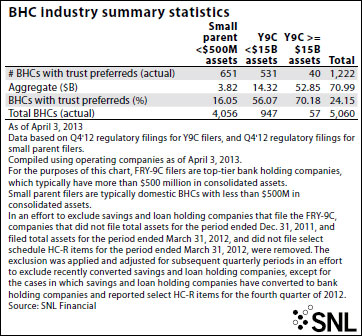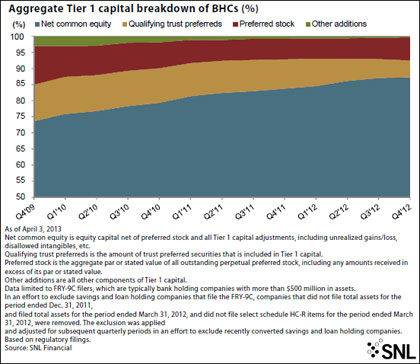SNL Report: Trust preferred fadeout continues
SNL Report: As investors redeem, legal shift staunches new supply
- |
- Written by SNL Financial

By Nathan Stovall & Salman Aleem Khan, SNL Financial staff writers
As redemptions of trust preferred securities continue to mount, their significance in banks' capital structures has diminished significantly.
For a larger version of this table, please click on the image or click here.
Trust preferred securities, or TruPS, have slowly come to comprise much smaller portions of banks' Tier 1 capital bases. Banks have built regulatory capital through earnings, common equity raises, and more recently through an increased reliance on preferred equity issuances, but they also have actively sought to redeem their outstanding TruPS. This has occurred without a new TruPS issuance of size in more than two years.
TruPS redemptions began around the same time that new issuance activity ceased, with large banks leading the charge because institutions with more than $15 billion in assets knew the securities would lose their qualification as Tier 1 capital under the Dodd-Frank Act and become costly Tier 2 capital, or, effectively, expensive debt.
Significant shrinkage as quarters tick by
Redemptions accelerated dramatically though in the summer and fall of 2012, coming in droves after regulators proposed capital rules in early June that confirmed TruPS issued by all banks, not just institutions with more than $15 billion in assets, would lose Tier 1 regulatory capital status. Redemptions have continued through the first quarter, helping to shrink the amount of TruPS on bank balance sheets even further.
Since the proposed capital regime has come to light, large banks such as JPMorgan Chase & Co., Citigroup Inc., BB&T Corp., Bank of America Corp., SunTrust Banks Inc., and even some smaller institutions such as CVB Financial Corp., Peoples Bancorp Inc., and Capital Bank Financial Corp., have announced or completed plans to redeem TruPS totaling at least $49 billion, according to research conducted by SNL.
With the redemptions, TruPS are now a far smaller portion of banks' Tier 1 capital bases. The amount of Tier 1 qualifying TruPS at consolidated bank holding company filers--the vast majority of which have more than $500 million in assets--fell to $67.5 billion at the end of the fourth quarter of 2012 from $77.7 billion in the third quarter of 2012 and $113.1 billion in the fourth quarter of 2011, according to SNL data.
Since banks have redeemed at least $11 billion in TruPS since the end of 2012 and no new TruPS have been issued, the amount of TruPS outstanding has likely fallen to close to $55 billion.
Even without the more recent redemptions, SNL data show that qualifying TruPS accounted for just 5.29% of Tier 1 capital at those institutions in the fourth quarter of 2012, down from 5.92% in the third quarter of 2012 and 9.09% in the fourth quarter of 2011. In the last three years, TruPS peaked as a percentage of banks' Tier 1 capital at 11.54% in the first quarter of 2010.
What's filling the hole?
Many banks redeeming TruPS have opted to issue preferred equity as replacement capital in conjunction with the transactions. Those replacement capital raises played a role in preferred equity issuances rising to $18.94 billion in 2012, up 46% from a year earlier, according to SNL data.
The redemptions and related preferred equity raises have been dominated by banks with more than $15 billion in assets. Those institutions long expected TruPS to lose its regulatory capital status along with the passage of the Dodd-Frank Act, and the recently proposed Basel III capital regime only confirmed the change.
For a larger version of this table, please click on the image or click here.
Tagged under Financial Trends,
















